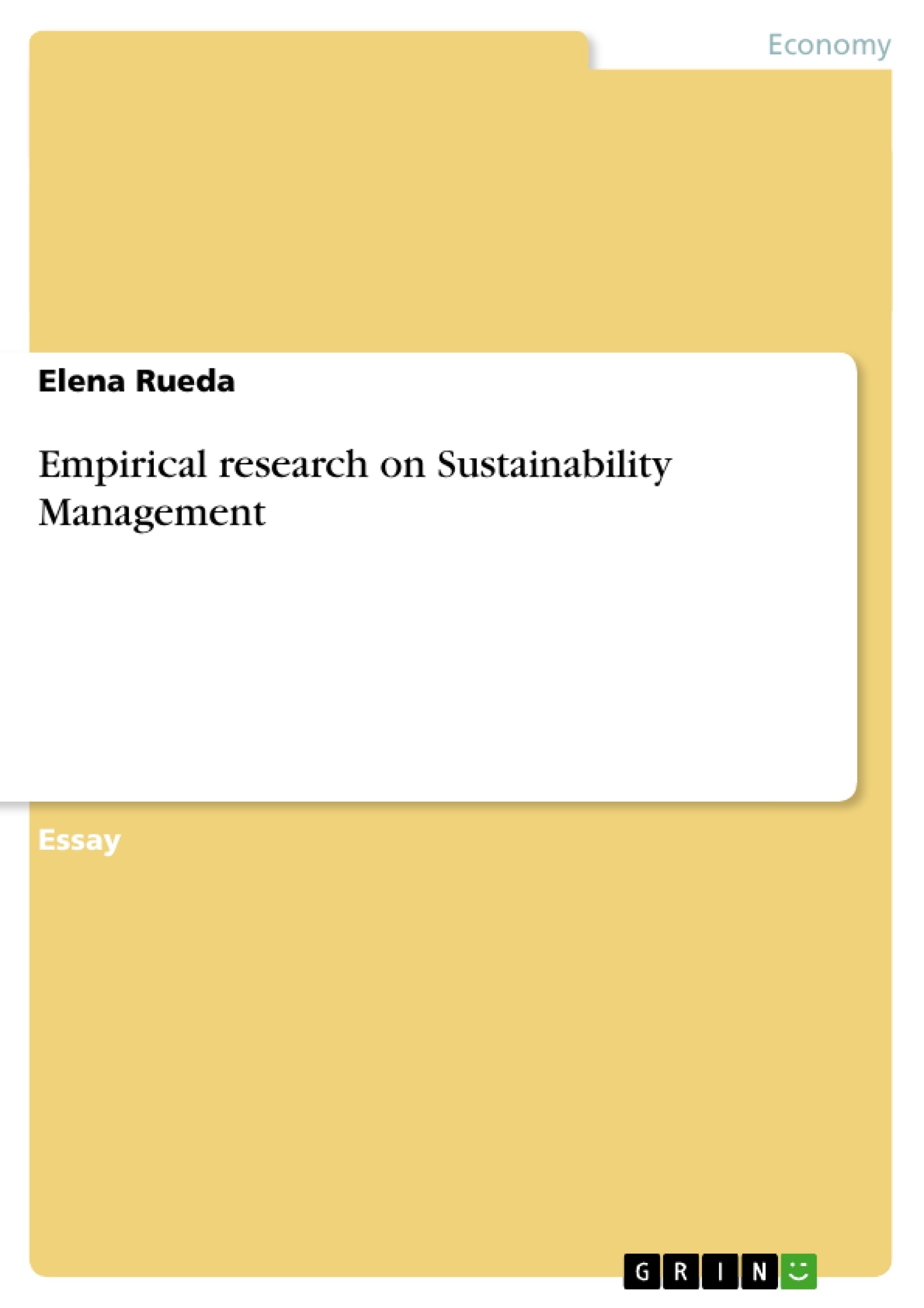Environmental management practices are influenced by :
- external stakeholders such as governments, regulators, customers, competitors, the community, environmental groups and industry associations
- firm characteristics and organizational structure
- industry effects
Analyzing the possible reactions of the actors involved in these three aspects could help finding out the implications of a given trend in the reality of environmental management in ten years time.
Inhaltsverzeichnis (Table of Contents)
- 1. STATUS AND TRENDS OF ENVIRONMENTAL MANAGEMENT
- 1.1 WHAT IS AFFECTING THE DEVELOPMENT OF ENVIRONMENTAL MANAGEMENT?
- 1.2 "SMALL ENTERPRISES ARE RATHER PASSIVE" – IMPLICATIONS
- 1.2.1. EXTERNAL STAKEHOLDERS
- 1.2.2. FIRM CHARACTERISTICS AND ORGANIZATIONAL STRUCTURE
- 1.2.3. INDUSTRY EFFECTS
- 2. INFLUENCE OF SOCIAL MANAGEMENT AND PERFORMANCE ON ECONOMIC PERFORMANCE AND COMPETITIVENESS
- 2.1 FINDINGS
- 2.2. DIFFERENCES BETWEEN THE FINDINGS OF EARLIER AND RECENT STUDIES
- 2.3. MILESTONES AND OBSTACLES OF EMPIRICAL ANALYSIS
- 3. NON-FINANCIAL REPORTING
- 3.1. SOCIAL DEMANDS FACED BY COMPANIES REGARDING NON-FINANCIAL REPORTING
- 3.2. SPILLOVER EFFECTS OF NON-FINANCIAL REPORTING
- 4. THE EMPIRICAL EVIDENCE ON THE PORTER HYPOTHESIS
- 4.1. DIFFICULTIES OF EMPIRICAL TESTING OF THE PORTER HYPOTHESIS
- 4.2. WAYS TO OVERCOME EMPIRICAL TESTING DIFFICULTIES
Zielsetzung und Themenschwerpunkte (Objectives and Key Themes)
This research paper explores the current state and trends of environmental management, particularly focusing on the role of small enterprises. It aims to analyze the factors influencing the development of environmental management practices and the implications of small enterprise passivity in this regard. The study examines the influence of external stakeholders, firm characteristics, and industry effects on environmental management adoption. The paper also delves into the relationship between social management and economic performance, highlighting the importance of non-financial reporting.
- Environmental management trends and challenges
- The role of small enterprises in environmental management
- Influence of stakeholders on environmental management practices
- Relationship between social management and economic performance
- The impact of non-financial reporting
Zusammenfassung der Kapitel (Chapter Summaries)
- Chapter 1: Status and Trends of Environmental Management: This chapter presents ten key trends identified in the Ökoradar survey, highlighting the increasing focus on sustainability in businesses. The chapter explores the complex interplay of factors impacting environmental management, including government regulations, customer demand, and industry pressures.
- Chapter 2: Influence of Social Management and Performance on Economic Performance and Competitiveness: This chapter examines the connection between social management and economic performance, drawing upon findings from previous and current studies. It delves into the milestones and obstacles encountered in empirical analysis of this relationship.
- Chapter 3: Non-Financial Reporting: This chapter explores the growing demand for non-financial reporting from companies. It examines the social pressures driving this trend and the potential spillover effects of non-financial reporting on various stakeholders.
- Chapter 4: The Empirical Evidence on the Porter Hypothesis: This chapter analyzes the difficulties of empirically testing the Porter Hypothesis, which suggests that environmental regulations can drive innovation and economic growth. It explores potential methods to overcome these challenges.
Schlüsselwörter (Keywords)
The paper focuses on the following keywords: environmental management, small enterprises, sustainability, stakeholders, social management, economic performance, non-financial reporting, Porter Hypothesis, empirical research, Ökoradar survey.
Frequently Asked Questions
What factors influence environmental management practices in firms?
Influences include external stakeholders (governments, customers), firm characteristics (organizational structure), and specific industry effects.
Why are small enterprises often passive in environmental management?
Passivity is often linked to limited resources, lack of regulatory pressure compared to large firms, and a different organizational structure that may not prioritize sustainability trends.
What is the "Porter Hypothesis" mentioned in the research?
The Porter Hypothesis suggests that strict environmental regulations can actually trigger innovation and enhance economic performance and competitiveness rather than hindering it.
What role does non-financial reporting play for companies?
Non-financial reporting addresses social demands for transparency regarding environmental and social performance, which can have spillover effects on a company's reputation and economic success.
How does social management affect economic performance?
Empirical research explores the connection between a firm's social performance and its competitiveness, identifying milestones and obstacles in proving this relationship.
- Arbeit zitieren
- Elena Rueda (Autor:in), 2005, Empirical research on Sustainability Management, München, GRIN Verlag, https://www.hausarbeiten.de/document/74359


